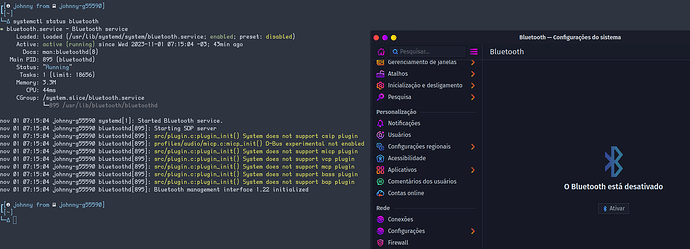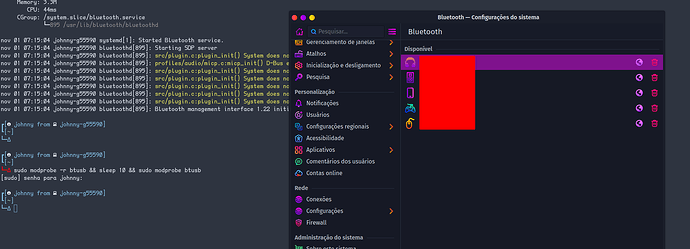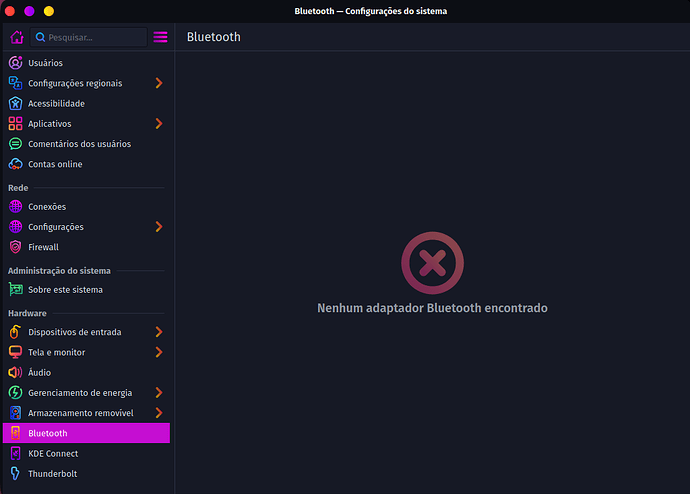Hello folks!
I don’t know why/when/how but somewhere along the line the system configuration and KDE interface stopped seeing my Bluetooth as being active, despite systemctl status showing it as running. This happens right when I turn the system on to start the day.
systemctl status bluetooth
● bluetooth.service - Bluetooth service
Loaded: loaded (/usr/lib/systemd/system/bluetooth.service; enabled; preset: disabled)
Active: active (running) since Wed 2023-11-01 07:15:04 -03; 43min ago
Docs: man:bluetoothd(8)
Main PID: 895 (bluetoothd)
Status: "Running"
Tasks: 1 (limit: 18656)
Memory: 3.3M
CPU: 44ms
CGroup: /system.slice/bluetooth.service
└─895 /usr/lib/bluetooth/bluetoothd
nov 01 07:15:04 johnny-g55590 systemd[1]: Started Bluetooth service.
nov 01 07:15:04 johnny-g55590 bluetoothd[895]: Starting SDP server
nov 01 07:15:04 johnny-g55590 bluetoothd[895]: src/plugin.c:plugin_init() System does not support csip plugin
nov 01 07:15:04 johnny-g55590 bluetoothd[895]: profiles/audio/micp.c:micp_init() D-Bus experimental not enabled
nov 01 07:15:04 johnny-g55590 bluetoothd[895]: src/plugin.c:plugin_init() System does not support micp plugin
nov 01 07:15:04 johnny-g55590 bluetoothd[895]: src/plugin.c:plugin_init() System does not support vcp plugin
nov 01 07:15:04 johnny-g55590 bluetoothd[895]: src/plugin.c:plugin_init() System does not support mcp plugin
nov 01 07:15:04 johnny-g55590 bluetoothd[895]: src/plugin.c:plugin_init() System does not support bass plugin
nov 01 07:15:04 johnny-g55590 bluetoothd[895]: src/plugin.c:plugin_init() System does not support bap plugin
nov 01 07:15:04 johnny-g55590 bluetoothd[895]: Bluetooth management interface 1.22 initialized
If I run sudo modprobe -r btusb && sleep 10 && sudo modprobe btusb as @tbg suggested here, KDE sees the Bluetooth as active once again…
But it’s a pain to manually reset the Bluetooth everytime I tun the computer on, I’d really like to solve whatever problem is going on here.
System:
Kernel: 6.5.9-zen2-1-zen arch: x86_64 bits: 64 compiler: gcc v: 13.2.1 clocksource: tsc
available: acpi_pm parameters: BOOT_IMAGE=/@/boot/vmlinuz-linux-zen
root=UUID=468e3250-834f-4678-85b1-f50f268e557d rw rootflags=subvol=@ quiet console=tty0
console=ttyS0,115200n8 cryptomgr.notests initcall_debug intel_iommu=igfx_off
kvm-intel.nested=1 no_timer_check noreplace-smp page_alloc.shuffle=1 rcupdate.rcu_expedited=1
rootfstype=ext4,btrfs,xfs,f2fs tsc=reliable rd.udev.log_priority=3 vt.global_cursor_default=0
resume=UUID=92d5bc58-440e-4eab-9f01-4fa35d34e02b loglevel=3 rw ibt=off
Desktop: KDE Plasma v: 5.27.9 tk: Qt v: 5.15.11 wm: kwin_x11 vt: 2 dm: SDDM
Distro: Garuda Linux base: Arch Linux
Machine:
Type: Laptop System: Dell product: G5 5590 v: N/A serial: <superuser required> Chassis: type: 10
serial: <superuser required>
Mobo: Dell model: 0F3T2G v: A00 serial: <superuser required> UEFI: Dell v: 1.22.0
date: 11/10/2022
Battery:
ID-1: BAT0 charge: 45.4 Wh (100.0%) condition: 45.4/60.0 Wh (75.6%) volts: 16.9 min: 15.2
model: SMP DELL JJPFK87 type: Li-poly serial: <filter> status: full
CPU:
Info: model: Intel Core i7-9750H bits: 64 type: MT MCP arch: Coffee Lake gen: core 9 level: v3
note: check built: 2018 process: Intel 14nm family: 6 model-id: 0x9E (158) stepping: 0xA (10)
microcode: 0xF4
Topology: cpus: 1x cores: 6 tpc: 2 threads: 12 smt: enabled cache: L1: 384 KiB
desc: d-6x32 KiB; i-6x32 KiB L2: 1.5 MiB desc: 6x256 KiB L3: 12 MiB desc: 1x12 MiB
Speed (MHz): avg: 4000 high: 4003 min/max: 800/4500 scaling: driver: intel_pstate
governor: powersave cores: 1: 4000 2: 4000 3: 4000 4: 4000 5: 4000 6: 4000 7: 4000 8: 4000
9: 4000 10: 4003 11: 4000 12: 4000 bogomips: 62399
Flags: avx avx2 ht lm nx pae sse sse2 sse3 sse4_1 sse4_2 ssse3 vmx
Vulnerabilities: <filter>
Graphics:
Device-1: Intel CoffeeLake-H GT2 [UHD Graphics 630] vendor: Dell driver: i915 v: kernel
arch: Gen-9.5 process: Intel 14nm built: 2016-20 ports: active: none off: eDP-1 empty: DP-1,
DP-2, HDMI-A-1, HDMI-A-2 bus-ID: 00:02.0 chip-ID: 8086:3e9b class-ID: 0300
Device-2: NVIDIA TU106M [GeForce RTX 2060 Mobile] vendor: Dell driver: nvidia v: 535.113.01
alternate: nouveau,nvidia_drm non-free: 535.xx+ status: current (as of 2023-09) arch: Turing
code: TUxxx process: TSMC 12nm FF built: 2018-22 pcie: gen: 3 speed: 8 GT/s lanes: 8 link-max:
lanes: 16 bus-ID: 01:00.0 chip-ID: 10de:1f11 class-ID: 0300
Device-3: Microdia [] driver: uvcvideo type: USB rev: 2.0 speed: 480 Mb/s lanes: 1 mode: 2.0
bus-ID: 1-5:3 chip-ID: 0c45:671f class-ID: 0e02
Display: x11 server: X.Org v: 21.1.9 with: Xwayland v: 23.2.2 compositor: kwin_x11 driver: X:
loaded: modesetting,nvidia unloaded: nouveau alternate: fbdev,intel,nv,vesa dri: iris gpu: i915
display-ID: :0 screens: 1
Screen-1: 0 s-res: 2560x2160 s-dpi: 114 s-size: 571x482mm (22.48x18.98") s-diag: 747mm (29.42")
Monitor-1: DP-0 pos: primary,top res: 2560x1080 dpi: 81 size: 798x334mm (31.42x13.15")
diag: 865mm (34.06") modes: N/A
Monitor-2: HDMI-0 pos: bottom res: 2560x1080 hz: 60 dpi: 96 size: 677x290mm (26.65x11.42")
diag: 736mm (29") modes: N/A
Monitor-3: eDP-1-1 size-res: N/A modes: N/A
API: EGL v: 1.5 hw: drv: nvidia platforms: gbm: drv: nvidia
API: OpenGL v: 4.6.0 vendor: nvidia v: 535.113.01 glx-v: 1.4 direct-render: yes renderer: NVIDIA
GeForce RTX 2060/PCIe/SSE2 memory: 5.86 GiB
API: Vulkan v: 1.3.269 layers: 14 device: 0 type: integrated-gpu name: Intel UHD Graphics 630
(CFL GT2) driver: mesa intel v: 23.2.1-arch1.2 device-ID: 8086:3e9b surfaces: xcb,xlib
device: 1 type: discrete-gpu name: NVIDIA GeForce RTX 2060 driver: nvidia v: 535.113.01
device-ID: 10de:1f11 surfaces: xcb,xlib device: 2 type: cpu name: llvmpipe (LLVM 16.0.6 256
bits) driver: mesa llvmpipe v: 23.2.1-arch1.2 (LLVM 16.0.6) device-ID: 10005:0000
surfaces: xcb,xlib
Audio:
Device-1: Intel Cannon Lake PCH cAVS vendor: Dell driver: snd_hda_intel v: kernel
alternate: snd_soc_skl,snd_sof_pci_int
el_cnl bus-ID: 00:1f.3 chip-ID: 8086:a348 class-ID: 0403
Device-2: NVIDIA TU106 High Definition Audio vendor: Dell driver: snd_hda_intel v: kernel pcie:
gen: 3 speed: 8 GT/s lanes: 8 link-max: lanes: 16 bus-ID: 01:00.1 chip-ID: 10de:10f9
class-ID: 0403
Device-3: Generalplus [] driver: hid-generic,snd-usb-audio,usbhid type: USB rev: 1.1
speed: 12 Mb/s lanes: 1 mode: 1.1 bus-ID: 1-4.1:4 chip-ID: 1b3f:2008 class-ID: 0300
Device-4: Realtek [] driver: snd-usb-audio type: USB rev: 2.0 speed: 480 Mb/s lanes: 1
mode: 2.0 bus-ID: 1-4.5:8 chip-ID: 0bda:4014 class-ID: 0102 serial: <filter>
API: ALSA v: k6.5.9-zen2-1-zen status: kernel-api with: aoss type: oss-emulator tools: N/A
Server-1: PipeWire v: 0.3.83 status: active with: 1: pipewire-pulse status: active
2: wireplumber status: active 3: pipewire-alsa type: plugin 4: pw-jack type: plugin
tools: pactl,pw-cat,pw-cli,wpctl
Network:
Device-1: Realtek vendor: Dell driver: r8169 v: kernel pcie: gen: 1 speed: 2.5 GT/s lanes: 1
port: 3000 bus-ID: 3c:00.0 chip-ID: 10ec:2502 class-ID: 0200
IF: enp60s0 state: down mac: <filter>
Device-2: Qualcomm Atheros QCA6174 802.11ac Wireless Network Adapter vendor: Dell
driver: ath10k_pci v: kernel pcie: gen: 1 speed: 2.5 GT/s lanes: 1 bus-ID: 3d:00.0
chip-ID: 168c:003e class-ID: 0280 temp: 48.0 C
IF: wlp61s0 state: down mac: <filter>
Device-3: Realtek RTL8153 Gigabit Ethernet Adapter driver: r8152 type: USB rev: 3.0
speed: 5 Gb/s lanes: 1 mode: 3.2 gen-1x1 bus-ID: 6-1.2:3 chip-ID: 0bda:8153 class-ID: 0000
serial: <filter>
IF: enp58s0u1u2 state: up speed: 1000 Mbps duplex: full mac: <filter>
Bluetooth:
Device-1: Qualcomm Atheros [] driver: btusb v: 0.8 type: USB rev: 2.0 speed: 12 Mb/s lanes: 1
mode: 1.1 bus-ID: 1-14:7 chip-ID: 0cf3:e007 class-ID: e001
Report: btmgmt ID: hci0 rfk-id: 2 state: up address: <filter> bt-v: 4.2 lmp-v: 8 status:
discoverable: no pairing: no class-ID: 7c010c
Drives:
Local Storage: total: 1.14 TiB used: 862.72 GiB (73.7%)
SMART Message: Unable to run smartctl. Root privileges required.
ID-1: /dev/nvme0n1 maj-min: 259:0 vendor: Western Digital model: PC SN520 NVMe WDC 256GB
size: 238.47 GiB block-size: physical: 512 B logical: 512 B speed: 15.8 Gb/s lanes: 2 tech: SSD
serial: <filter> fw-rev: 20240012 temp: 58.9 C scheme: GPT
ID-2: /dev/sda maj-min: 8:0 vendor: Western Digital model: WD10SPZX-75Z10T3 size: 931.51 GiB
block-size: physical: 4096 B logical: 512 B speed: 6.0 Gb/s tech: HDD rpm: 5400 serial: <filter>
fw-rev: 4514 scheme: GPT
Partition:
ID-1: / raw-size: 221.19 GiB size: 221.19 GiB (100.00%) used: 129.8 GiB (58.7%) fs: btrfs
dev: /dev/nvme0n1p2 maj-min: 259:2
ID-2: /boot/efi raw-size: 300 MiB size: 299.4 MiB (99.80%) used: 636 KiB (0.2%) fs: vfat
dev: /dev/nvme0n1p1 maj-min: 259:1
ID-3: /home raw-size: 221.19 GiB size: 221.19 GiB (100.00%) used: 129.8 GiB (58.7%) fs: btrfs
dev: /dev/nvme0n1p2 maj-min: 259:2
ID-4: /var/log raw-size: 221.19 GiB size: 221.19 GiB (100.00%) used: 129.8 GiB (58.7%)
fs: btrfs dev: /dev/nvme0n1p2 maj-min: 259:2
ID-5: /var/tmp raw-size: 221.19 GiB size: 221.19 GiB (100.00%) used: 129.8 GiB (58.7%)
fs: btrfs dev: /dev/nvme0n1p2 maj-min: 259:2
Swap:
Kernel: swappiness: 133 (default 60) cache-pressure: 100 (default) zswap: no
ID-1: swap-1 type: zram size: 15.31 GiB used: 12.5 MiB (0.1%) priority: 100 comp: zstd
avail: lzo,lzo-rle,lz4,lz4hc,842 max-streams: 12 dev: /dev/zram0
ID-2: swap-2 type: partition size: 16.98 GiB used: 0 KiB (0.0%) priority: -2
dev: /dev/nvme0n1p3 maj-min: 259:3
Sensors:
System Temperatures: cpu: 75.0 C pch: 78.0 C mobo: N/A gpu: nvidia temp: 61 C
Fan Speeds (rpm): N/A
Info:
Processes: 339 Uptime: 1h 30m wakeups: 5 Memory: total: 16 GiB note: est. available: 15.31 GiB
used: 7.13 GiB (46.6%) Init: systemd v: 254 default: graphical tool: systemctl Compilers:
gcc: 13.2.1 clang: 16.0.6 Packages: 1957 pm: pacman pkgs: 1948 libs: 497
tools: gnome-software,octopi,pamac,paru,yay pm: flatpak pkgs: 9 Client: shell wrapper
v: 5.2.15-release inxi: 3.3.30
Garuda (2.6.17-1):
System install date: 2023-04-01
Last full system update: 2023-10-31
Is partially upgraded: No
Relevant software: snapper NetworkManager dracut nvidia-dkms
Windows dual boot: No/Undetected
Failed units:


